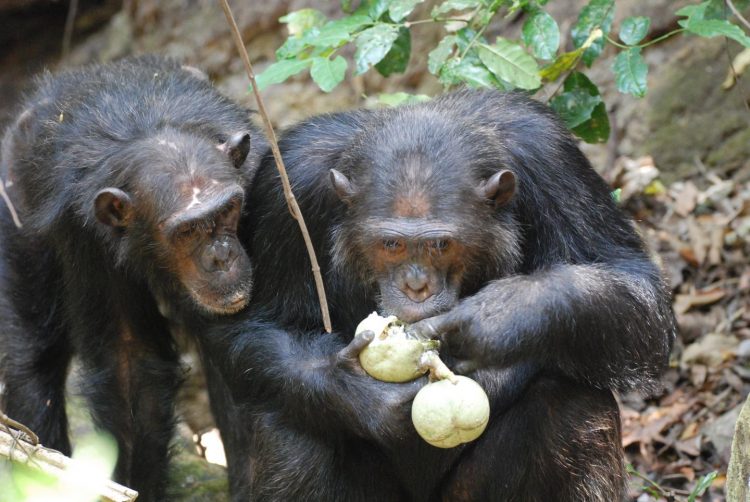Compared with apes, people's gut bacteria lack diversity, study finds

Chimpanzees are shown in Gombe Stream National Park. Credit: Ian Gilby
Based on an analysis of how humans and three lineages of ape diverged from common ancestors, researchers determined that within the lineage that gave rise to modern humans, microbial diversity changed slowly and steadily for millions of years, but that rate of change has accelerated lately in humans from some parts of the world.
People in nonindustrialized societies have gut microbiomes that are 60 percent different from those of chimpanzees. Meanwhile, those living in the U.S. have gut microbiomes that are 70 percent different from those of chimps.
“It took millions of years, since humans and chimpanzees split from a common ancestor, to become 60 percent different in these colonies living in our digestive systems,” said Howard Ochman, professor of integrative biology at The University of Texas at Austin and co-author of the study. “On the other hand, in apparently only hundreds of years — and possibly a lot fewer — people in the United States lost a great deal of diversity in the bacteria living in their gut.”
That rapid change might translate into negative health effects for Americans. Previous research has shown that compared with several populations, people living in the U.S. have the lowest diversity of gut microbes. Still other research has linked a lack of microbial diversity in human guts to various diseases such as asthma, colon cancer and autoimmune diseases.
The results of this latest study, carried out by researchers from The University of Texas at Austin, Yale University, the University of Pennsylvania and elsewhere, appear this week in the journal Proceedings of the National Academy of Sciences. The lead author is Andrew Moeller, a visiting scholar at The University of Texas at Austin and a graduate student at Yale University.
One possible explanation for humans evolving to have less diversity in their gut microbiomes is that they shifted to a diet with more meat and fewer plants. Plants require complex communities of microbes to break them down, which is not as true for meat.
As for why Americans have experienced much more rapid changes in microbial diversity compared with people in less industrialized societies, some experts have suggested more time spent indoors, increased use of antibacterial soaps and cleaners, widespread use of antibiotics and high numbers of births by Cesarean section all may play a role. Antibiotics and antimicrobial cleaners can kill good bacteria along with the bad, and C-section deliveries prevent babies from receiving certain bacteria from the mother typically conferred during vaginal births.
“Declining diversity in the gut has been a trend for a long time,” said Ochman. “It's tantalizing to think that the decrease in microbial diversity in humans is due only to modern medical practices and other lifestyle changes, but this research shows other factors over time also must have played a role.”
The researchers analyzed the genetic makeup of bacteria in fecal samples from humans, chimpanzees, bonobos and gorillas to draw their conclusions.
Moeller and Ochman's co-authors are Yingying Li at the University of Pennsylvania; Eitel Mpoudi-Ngole at the Institut de Recherches Médicales et d'Études des Plantes Médicinales, Prévention du Sida au Cameroun (Republic of Cameroon); Steve Ahuka-Mundeke at Institut National de Recherche Biomédicale (Democratic Republic of Congo) and the University of Montpellier (France); Elizabeth Lonsdorf at Franklin & Marshall College; Anne Pusey at Duke University; Martine Peeters at the University of Montpellier; and Beatrice Hahn at the University of Pennsylvania.
This work was supported by grants from the National Institutes of Health, the National Science Foundation, Agence Nationale de Recherche sur le Sida and the Jane Goodall Institute.
Download the paper “Rapid changes in the gut microbiome during human evolution” (PNAS, November 3,2014) at: http://www.pnas.org/content/early/2014/10/29/1419136111.full.pdf+html
Media Contact
More Information:
http://www.utexas.edu/All latest news from the category: Life Sciences and Chemistry
Articles and reports from the Life Sciences and chemistry area deal with applied and basic research into modern biology, chemistry and human medicine.
Valuable information can be found on a range of life sciences fields including bacteriology, biochemistry, bionics, bioinformatics, biophysics, biotechnology, genetics, geobotany, human biology, marine biology, microbiology, molecular biology, cellular biology, zoology, bioinorganic chemistry, microchemistry and environmental chemistry.
Newest articles

High-energy-density aqueous battery based on halogen multi-electron transfer
Traditional non-aqueous lithium-ion batteries have a high energy density, but their safety is compromised due to the flammable organic electrolytes they utilize. Aqueous batteries use water as the solvent for…

First-ever combined heart pump and pig kidney transplant
…gives new hope to patient with terminal illness. Surgeons at NYU Langone Health performed the first-ever combined mechanical heart pump and gene-edited pig kidney transplant surgery in a 54-year-old woman…

Biophysics: Testing how well biomarkers work
LMU researchers have developed a method to determine how reliably target proteins can be labeled using super-resolution fluorescence microscopy. Modern microscopy techniques make it possible to examine the inner workings…





















